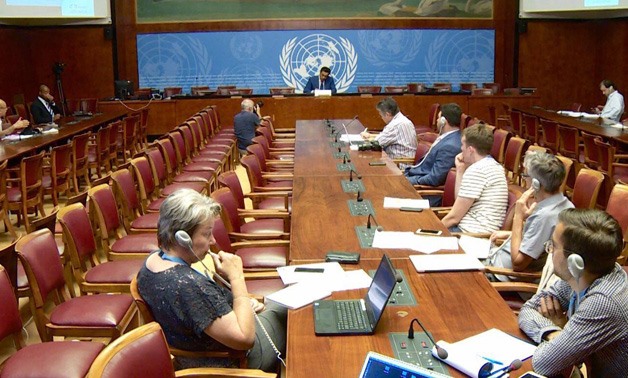
Qatar’s NHRC head Ali Al-Mari during the confrance - press photo
CAIRO – 16 June 2017: The head of Qatar’s National Committee for Human Rights said Friday that his country is suffering from the severance of diplomatic ties between Qatar and the Arab Gulf states, and the closure of air space and seaports to Qatar.
 Qatar’s NHRC statment -press photo
Qatar’s NHRC statment -press photo
NHRC President Ali Al-Mari demanded compensation for the damage done to the Qatari people in statements before the conference held in Geneva. Qatar will “turn to all international means” to help them in their cause, he added.
Mari’s statements, however, were widely questioned by the United Nations reporters present at the conference, as they completely contradicted statements from Qatari officials who insisted their country had not been negatively affected.
“How can you explain the contradiction between your statements now and the past statements by Qatari officials saying your country wasn’t affected due to cutting ties?” one of the reporters asked. Mari, however, did not seem to have an answer.
Mari’s conference was held shortly after the UAE, Saudi Arabia and Bahrain permanent missions’ press conference at the U.N. Friday morning.
A statement was released by the missions commenting on early remarks by the High Commissioner for Human Rights regarding the Qatari situation. “Decisions to cut ties with Qatar are a sovereign right of the States concerned and aim to protect their national security from the dangers of terrorism and extremism,” the joint statement read.
The statement added that despite the political movements against Doha’s government, their governments had taken many measures regarding the Qatari people affected by the political situation.
“Further to these decisions and for the sake of our brotherly Qatari people, which is a natural extension of its brothers in the three States, it was decided to take many measures aimed at addressing humanitarian and health cases, establish hot lines in each country so that cases can be reported and appropriate action be taken, in a manner consistent with international obligations under international human rights law and our long humanitarian traditions,” the statement stated.
Qatar’s relations with several Arab and Gulf States have been strained since May24, when the Qatari state-run news agency reported Sheikh Tamim Al Thani’s statements regarding Gulf foreign policy with Iran, describing it as “unwise.”
On Monday, June 5, Egypt, Saudi Arabia, the UAE, Bahrain, Libya and Yemen decided to cut all diplomatic ties with Qatar for its “continuous support for terrorism,” closing their airspace and seaports to Qatari transportation.
Later in statements, Egypt and the Gulf states gave the Qatari diplomatic missions in their countries 48 hours to leave.
On Tuesday, June 6, Kuwaiti Emir Sabah Al-Ahmad started a tour that included Saudi Arabia, the UAE and Qatar in an attempt to mediate between the three countries.
No official details were published about the results of the meetings; however, according to Bahraini Foreign Minister Khalid bin Ahmed Al-Khalifa’s statements to Saudi newspaper Makkah on June 8, Kuwait’s attempts at reconciliation had “failed.”

Comments
Leave a Comment